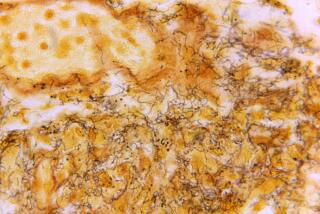Rate of U.S. Babies Born With Syphilis Falls 51%
- Share via
After a three-year campaign to eradicate congenital syphilis, the rate of babies born with the disease has dropped by half, the Centers for Disease Control and Prevention reported Thursday.
A mothers with syphilis will pass the infection to her fetus. The disease is otherwise spread by sexual contact. If not treated, up to 40% of infants with syphilis die, while others will face developmental problems and seizures. Found early enough, however, syphilis is easily treated. A single dose of penicillin given to an expectant mother is enough to prevent infection in her infant.
According to the new CDC report, the rate of babies born with syphilis has dropped 51% since 1997, resulting in only 529 cases in 2000. Officials hailed those numbers as a victory, saying that the cornerstone of their fight against the disease has been early detection and treatment of syphilis in pregnant women.
Congenital syphilis is closely linked to the incidence of the disease in women ages 15 to 44. Cases of the disease declined 38% among women in that age group during the same period.
To see such a remarkable drop in the disease in such a short time was beyond the CDC’s expectations. “Three years is literally a heartbeat in public health time,” said Judith Wasserheit, director of the CDC’s sexually transmitted disease prevention program.
The goals of the program were met by all states except Arkansas and South Carolina, which have the highest rates of babies born with syphilis. California ranks 12th in the nation, with 16.5 cases per 100,000 live births, a total of 86 cases in 2000.
In the late 1980s, Los Angeles was “the congenital syphilis capital of the country,” attributable to rampant crack cocaine use, which often leads to prostitution to buy drugs, said Robert Settlage, director of the Los Angeles County Health Department’s sexually transmitted disease program. “Fortunately, those days are behind us.”
The few cases of congenital syphilis that do still occur in Los Angeles County are “because of slips in the health care” system, he said, adding that health care professionals need to be “aware and vigilant.”
African American communities in the South continue to be hardest hit by the disease and are the focus of the CDC’s efforts to defeat congenital syphilis.
The rate of congenital syphilis among African Americans is 49.5 cases per 100,000 live births, compared with only 1.5 in whites. But “the issue is not race,” said George Counts, director of the CDC’s efforts to eliminate syphilis. Rather, blacks are concentrated in the poor communities, particularly in the rural South, which are hit hardest by the disease. Inadequate health care coverage is a chief problem.
For communities with high syphilis rates, “the consequences are severe,” said Wasserheit. In addition to endangering infant health, syphilis causes lesions that increase the risk of HIV transmission. The program to eliminate the disease provides a chance to make “a profound impact on infant health,” she said. In addition to preserving the health of hundreds of babies, eliminating congenital syphilis would also save an estimated $1 billion annually in health costs.
While the eradication of syphilis may be impossible, elimination of congenital syphilis “is a feasible goal,” said Counts. The small number of cases and the geographical concentration of the disease improve the chances for wiping it out.
The CDC strategy to combat syphilis has focused on a partnership with local governments and health care providers to increase awareness of the disease and what can be done to end it. Everyone “wants their babies to be healthy,” Wasserheit noted.
Screening pregnant women is the single most important step, officials said. The CDC has pushed to make syphilis tests available in emergency rooms, jails and other places that provide on-the-spot care to pregnant women. Women who miscarry after 20 weeks of pregnancy should also be tested, as syphilis could be the cause.
The U.S. is close to being able to wipe out at least congenital syphilis, said Counts, adding that “if we fail to take advantage of this historic opportunity, the health of our communities and of our families will continue to suffer.”






